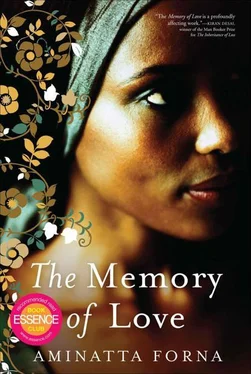The dry season was at its height. The view of the hills from the town had virtually disappeared and the sun looked more like the moon, pale behind the veil of dust. I remember it was January because that was also the month of the faculty wives’ dinner.
That year, the one I am talking about, it was a cool evening; gusts of desert wind blew through the gathering. The Dean, naturally, was there and we spoke for a few minutes until he left us to go and work the room, as was his way. His efforts would pay off when ten years later he was appointed Vice Chancellor.
One thing of note occurred: Saffia was unwell later in the evening. She’d been drinking, brandy and ginger ale. I put it down to her inexperience with alcohol.
This had all been in the days before I noticed Saffia leave the house with her orange scarf wrapped around her hair. I wondered why she didn’t take her car. Now the decision made some sort of sense. She still drove the Volkswagen Variant. It wouldn’t do to draw attention to herself on her old street.
I considered my alternatives. I decided to pursue my own line of enquiry.
One afternoon I made my way to the pink house. It had been two years since I’d last visited, three since Julius had died. Not much had changed. The neighbour, the fish mammy as I thought of her, was still in residence. At least her chair occupied the same place upon the verandah and I thought I heard her voice coming from behind the house. The orange tree in the yard was overgrown, the branches bowed. The door of the house was solidly locked. New tenants had arrived after Saffia and her aunt left. I supposed they must have moved on and the landlord had his own plans for the place.
The whole place had an air of neglect. What was it that made it so? The darkness at the windows? The absence of tread upon the stone stairs, now covered in dust? Or just the inexplicable lack of a life force. The pink house was utterly still.
I walked down the side of the house, where I knew there could be found a small gate. It had been rarely used, except by Saffia when she was delivering the potted plants and hanging baskets she sold for weddings and other events. The gate opened easily. Somehow this was exactly as I knew it would be. The garden was ordered and neat. Somebody had been here recently. The thought entered my mind that the landlord had employed a gardener while the house was empty. As I walked on I knew the idea carried no weight. No doubt at all, this was Saffia’s doing. I made my way down the path to the end of the garden and back into the past. The place I had stood drunkenly under the tree and stared at the stars on the night of the moon landing. Where I had stood with Saffia before the Harmattan lilies in the first weeks of our meeting. And again two years ago, when she had briefly alluded to the possibility of a future and my heart had crowded with hope.
The lilies were splendid. Dozens of them, deepest crimson, their great funnel-shaped heads turned towards me. Can a flower adopt an expression? I ask because I know you will think me fanciful if I say so, or thought so then. Standing there, it was as though I had opened a door upon a roomful of silent children: watchful, listening, waiting. I knew I had found what I’d been looking for. I turned to go.
The fish mammy was there on her verandah when I left. I felt her eyes upon my back as I walked down the street. For once she was silent.
And in her silence she was more eloquent than in anything her barbed tongue could produce.
In the final weeks of 1972, our daughter was born. I told myself I had given Saffia the one thing Julius had not. It made no difference. Saffia remained as remote as ever. A stillness came over her. It was as if she had realised her error in marrying me, but now it was too late. So, as many women do, she swallowed the bitterness of her regret and submitted. The stillness was what was left.
The aunt came back from the village and Saffia relinquished most of the responsibility of the child to her. In our gratitude we named the child for the old lady. Not the little girl’s real name, for that had already been chosen, but her house name, the name we called her by.
As for me, I loved the child from the start. And she loved me in return. I have no doubt this is the experience of all men, or at the very least a great many. Perhaps even to talk of an infant’s love is a foolishness, for doesn’t a child love selfishly, like a puppy, whoever will take care of them? But for once in my life I never had to ask what somebody saw in me, or question why she might wish to spend her time with me, wonder at her motives. She was my daughter. I, her father. The first love I had ever been able to take for granted.
Even Babagaleh came under the child’s spell. She taught him his letters, you know. I would find him sitting among her dolls and teddy bears in front of a toy blackboard. She liked to play teacher. Later he sat with her while she did her homework. He’d copy out the same sums and sentences alongside her. In this way he learned to read, and he reads perfectly well, though he is careful to maintain otherwise. He would take her to the mosque with him on Fridays and show her off … pretend … his own daughter …
Wheezing. A flailing arm. A shaking hand. The old man’s body convulses upon the bed. His mouth opens and closes. Adrian jumps up, puts his arms under the old man’s armpits and pulls him up. He runs to the door and calls a nurse. He waits in the corridor while the nurse attends to her patient.
All around him is silence, save for the hollow scrape of a bucket being pushed along the floor of the corridor, the slosh of water. The sound of the hospital gates opening and a vehicle entering.
Adrian thinks about the last part of Elias Cole’s story. The child, of course, was Mamakay.
In a bar, Pedro’s, where Adrian has been with Kai. Adrian has left Mamakay at the table while he goes to fetch drinks.
‘One beer, one rum and Coke,’ he says to the barman, holding up a finger against the din. The bar area is crowded. With difficulty Adrian turns himself around and leans against the bar so he can see Mamakay.
‘Great place!’ says the man next to him.
Adrian turns and nods. The other man is young, younger than Adrian at any rate, dressed in chinos and a polo shirt, the modern uniform of the European in the tropics; his skin is sweating and yellowish. He sits with his back to the bar, his thumbs hooked into his pockets, fingers framing his crotch. On the other side of him a sullen-faced woman leans curled into his body. Her left hand slips up and down the inside of the man’s thigh. Adrian nods at her and as he does so recognises her as the girl in the purple top he’d seen here once before.
The man is still speaking. ‘My base is upcountry. I’m in town for a meeting with our funders. Have to take them round a few of our projects, reassure them we’re putting their money to excellent use, let them have their picture taken with a disabled kid, or better still a former child-soldier. That’s the sort of thing makes them cream.’
‘Is that right?’ says Adrian. He looks around for the barman.
‘Well, keep your fingers crossed for me. Because I like this place and I plan to stay.’ The man next to him is still talking. ‘The women,’ and here he whistles, leans over and whispers, ‘buy them a couple of Cokes and they’ll let you fuck them all night.’
At that moment the barman arrives with the drinks. Relieved, Adrian prepares to move on. As he makes to leave the man says, ‘I’m Robert. Hey, bring your girl over. Make an evening of it.’
‘No thanks,’ says Adrian.
At the table Mamakay watches him as he sets down the drinks. ‘Do you know that man?’
Читать дальше












